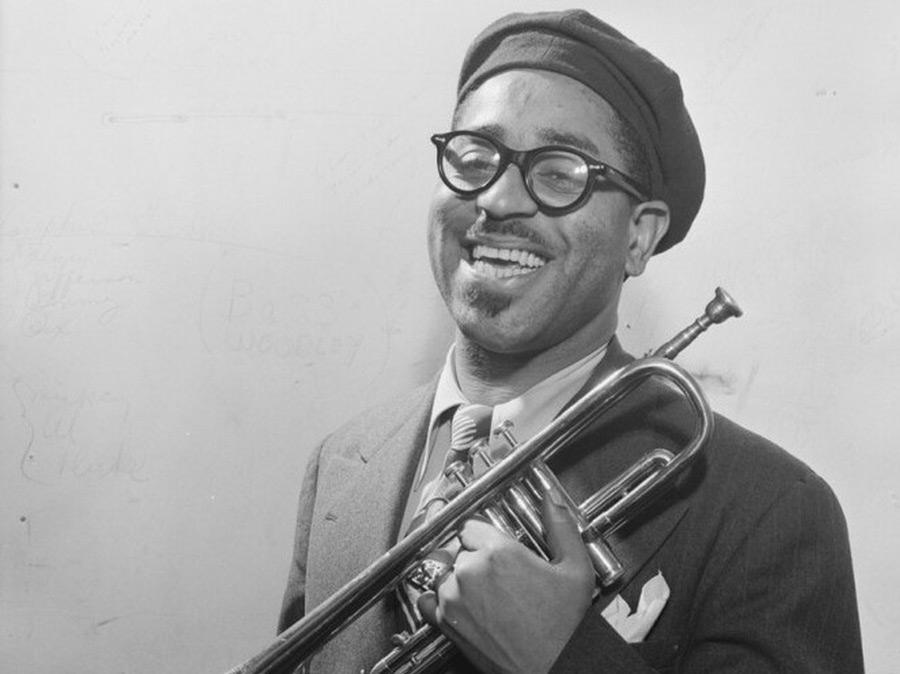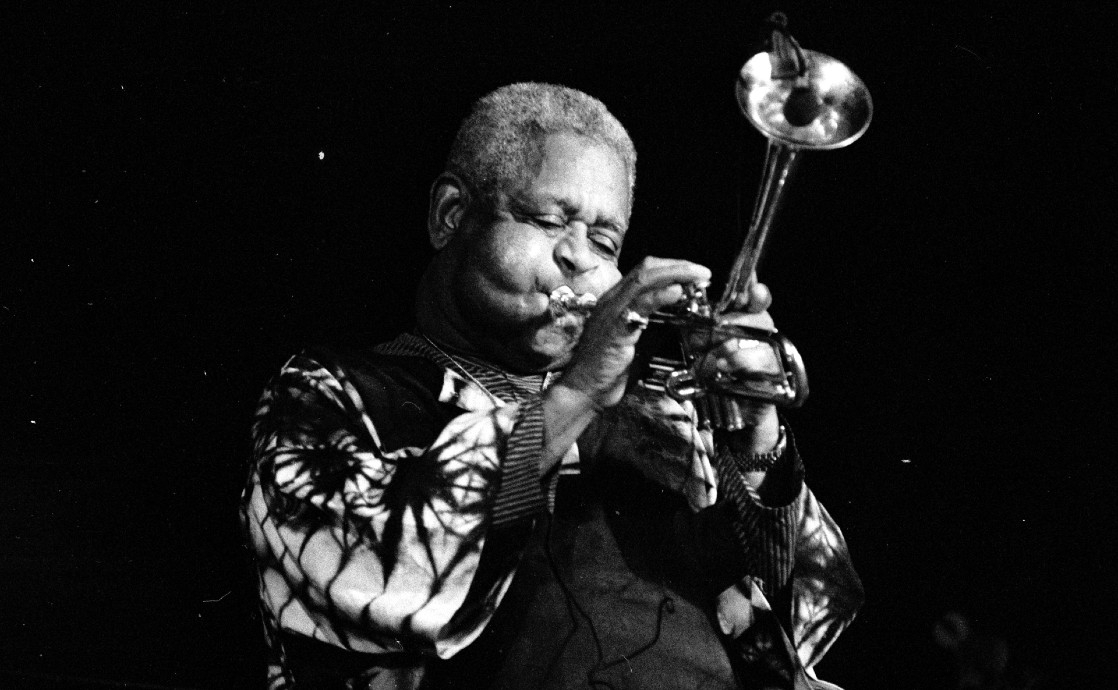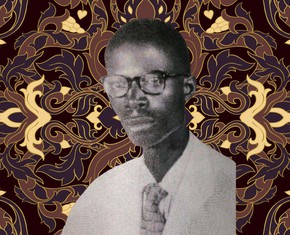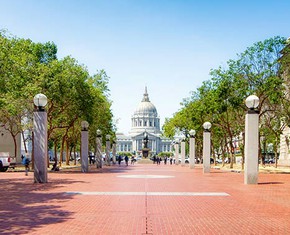The views expressed in our content reflect individual perspectives and do not represent the authoritative views of the Baha'i Faith.
…music, sung or played, is spiritual food for soul and heart. The musician’s art is among those arts worthy of the highest praise, and it moveth the hearts of all… – Abdu’l-Baha, Selections from the Writings of Abdu’l-Baha, p. 112.
Within the New York City Baha’i Center sits the John Birks Gillespie Auditorium, dedicated to the late jazz great, affectionately referred to as “Dizzy” due to his playful on-stage antics. Of course, many folks will remember his trumpeting skills; some might recall his mischievous humor, and still others may fondly think of his famous bent trumpet and puffy cheeks. People may also know of his numerous awards and accolades. However, perhaps not as many may know that this trumpet virtuoso and famous bebop musician was a Baha’i. Dizzy Gillespie wrote:
Becoming a Baha’i changed my life in every way and gave me a new concept of the relationship between God and man—between man and his fellow man—man and his family… I became more spiritually aware, and when you’re spiritually aware, that will be reflected in what you do… The [Baha’i] writings gave me new insight on what the plan is—God’s plan—for this time, the truth of the oneness of God, the truth of the oneness of the prophets, the truth of the oneness of mankind.

RELATED: How Electronic Dance Music Brought Me Closer to God
Born in South Carolina, John Birks Gillespie was the youngest of nine children. He began learning piano at the tender age of four, when many of us were playing at the park, and not quite ready for school. As his father was in a band, he was around many instruments as a child. By the age of 12, Dizzy had taught himself to play the trumpet. His high-caliber talents eventually earned him a musical scholarship to the Laurinburg Institute in North Carolina.
This gifted young man went on to create remarkable music. In addition to playing the trumpet, Dizzy was also a scat singer and composer, an innovator, and an improviser.
Watching YouTube videos of his performances alongside other musicians, demonstrating his fantastic horn techniques, showcasing his charming demeanor, and using his characteristic bent trumpet was not only entertaining but inspiring. But his musical prowess only reveals one mere facet of this talented man; he was also a spiritual being, attracted to the writings of Baha’u’llah—the prophet and founder of the Baha’i Faith.
The William Sears’ book “Thief in the Night”—a great book that reads like a mystery novel and encourages independent investigation of reality—impacted Dizzy’s soul and led him to the Baha’i Faith. Learning about the spiritual side of this musical genius reminded me how music can cheer our hearts, and take our minds off our worries and sadness. Music is an art form that truly can “moveth the hearts.” I’ve felt this power firsthand when I’ve struggled through challenging times—times when listening to an upbeat song helped take my mind off my pain.
Music is, in fact, so vital to all of us that Baha’u’llah discusses this topic in his book of laws:
We, verily, have made music as a ladder for your souls, a means whereby they may be lifted up unto the realm on high; make it not, therefore, as wings to self and passion. – The Most Holy Book, p. 38.
Isn’t that a lovely analogy? Thinking of music as a “ladder for [our] souls” provides a mental picture of that spiritual ladder quite literally lifting us off the ground. In other words, music helps connect us to the ethereal side of ourselves and lets us forget about worldly matters.
In yet another excerpt from the Baha’i writings, music is used as an important metaphor for teaching us about unity in diversity:
The diversity in the human family should be the cause of love and harmony, as it is in music where many different notes blend together in the making of a perfect chord. – Abdu’l-Baha, Paris Talks, p. 53.
RELATED: How the Power of Music Heals Racism
This quote from the Baha’i teachings is a particular favorite of mine, and I’m sure many people can relate to its gentle reminder that, despite our superficial physical differences, we are all one human race, and we should be loved and appreciated for the uniqueness of our individuality. When united, different musical notes create a beautiful song, just as different human personalities, ethnicities, sizes, and shapes create our beautiful global human family.
The life of this jazz legend, and the importance of music to our spiritual existence, cannot be solely contained within the confines of this short article. The legacy of Dizzy’s music will endure for future generations to enjoy. His timeless songs, and the joyfulness of his music will continue on, inspiring, uplifting and feeding our souls.
I hope this essay will encourage readers to learn more about Dizzy’s life, listen to his music, and delve deeper into the Faith he followed.
You May Also Like
Comments

















I knew the answer because even as a high school teen, I was a jazz fan...and I was not yet a Baha'i; that would come decades later. I won the competition that day.
With warmest regards,
Dottie Longo
I don't know the first thing about trumpets but I had the good fortune to hear Dizzy play at Ronnie Scott in London back in the early seventies. I remember his trumpet faced heaven and his cheeks filled with air like sails on a ship.
Arthur, UK
When I gave you a jazz book I had no idea how involved you two were with Manhattan's jazz scene, or that Mike has written more jazz books than I have read! LOL. Dizzy is one of the best known names in the business and your involvement is amazing. What kind of trumpet did Dizzy usually play? ( I have 150+ horns, ,including Los Angeles Olds (Ambassadors, Supers, even a Mendez, etc., early NY Vincent Bach Strad, late Strad, Doc Severinsen Goetzen , plenty of tubas and baritones, trombones, ...double bell euphoniums (King, Conn, Buescher,..) Played Rockefeller Center Tubachristmas twice, Boston once, + Columbus every year.
Hope all is well.
Brent S*****
MFHS 1966.
Army 68 -70, MP,
OU BBA72, Capital Law J,D, 1989,